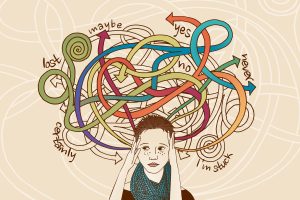Finding the Line: Sad or Depressed?

Where is the line? What is sadness? What is depression? When does sadness become problematic? Recognizing the difference between the emotion of sadness and the symptoms of depression can help us to process what we are experiencing, regardless of which it is, in the most healthy way.
Sadness is a common feeling. It is usually situational and is linked to a triggering event. Something happens, and we feel sad in response to it. We feel sad when we lose a loved one, experience a breakup, are disappointed, or watch a tear-jerking movie. We probably have felt or are feeling sad during this pandemic, with all its changes, cancelations, and uncertainties. Sadness is generally a transient feeling and usually passes with time.
Sadness is also a symptom of depression, and, when it lingers or impacts “normal” functioning, sadness may evolve into depression. Depression can just be there, covering you like a heavy blanket with no apparent cause. You feel sad and there isn’t really a reason for it. Or, something has happened that is upsetting or difficult; but it has really knocked you down, and you seem to be having trouble bouncing back from it.
When does sadness become depression? Sadness and tearfulness can be one face of depressive symptoms, but not the only one.
- There are also feelings of numbness, indecision, hopelessness, and helplessness.
- A person who is experiencing clinically depressive symptoms may also have difficulty with sleep or appetite, either too much or too little. These difficulties can be observed through visible weight loss or gain and tiredness.
- Losing sleep can also fuel depressed feelings since we need sleep to function. A person also may sleep too much. Getting out of bed becomes a real challenge.
- A person who is experiencing depressed mood may withdraw from others.
- Depression can cause us to have difficulty focusing. We may read the same document over and over but the information is not sinking in. On the outside, we may appear hyperactive and restless or may appear lethargic and worn-down.
- A person experiencing depression can lack the ability to feel excited or interested in the things that they used to view with enthusiasm.
- Another symptom of depression can be irritability. Most people may not think that anger and lashing out could be signs of depressed mood, but they can be.
- Thoughts about death in general can come, maybe thoughts about harming one’s self. If you are thinking about suicide, please reach out to someone!
If your friend or colleague is turning down plans to socialize or canceling plans frequently, this could be why. Are you finding yourself turning down opportunities to interact with others? If a colleague is late to work frequently, there could be multiple reasons; but depression could be one reason. A person who is feeling depressed may also neglect their hygiene and grooming. If your friend who normally appears very “put together” starts to appear disheveled, this can point to depressive symptoms. When you are depressed, taking care of yourself starts to take great effort. It takes great motivation and effort to groom yourself when you are depressed and depression depletes your motivation. Sometimes If you are looking at the things that used to bring you great joy and your response to them is “Meh…I don’t really care,” that could be a symptom. During the pandemic, we have had to be very creative to continue to engage in the activities that do excite us.
Someone experiencing this is not lazy; he or she may be depressed. Depression as a condition is becoming recognized for what it is—a health condition that will improve with treatment, not a weakness that you should “snap out of” or “just stop feeling like that.” Studies have found approximately 10% of the general population, almost 20% of law students, and over a quarter of lawyers have experienced some level of depression.
If your feelings are concerning you or getting in the way of you doing the things that you want to do or need to do, that matters and you can reach out and take action to start feeling better! Don’t be afraid to reach out to someone. It can feel scary but it doesn’t have to. Often other people are the mirror to help us to recognize problems when we can’t see them in ourselves. Our friends, peers, and loved ones know us as we normally are and can notice differences sometimes before we do.
Sometimes we have been struggling for so long we forgot how feeling good felt. Don’t be afraid to call one of us at VJLAP. It is confidential and free. If that is too much for right now, please reach out to a friend. Talk with a therapist or your doctor. Doing something now to give you hope of feeling better will help you more than you can imagine. The heavy, smothering blanket will lift and you will feel like you again. I have seen it happen time after time and you don’t have to stay in that dark place.
** This information is meant to provide an overview and should not be used as treatment or advice. Please consult with a professional regarding diagnosis or treatment.
Sources:
- Organ, D. Jaffe, & K. Bender, Suffering in Silence: The Survey of Law Student Well-Being and the Reluctance of Law Students to Seek Help for Substance Use and Mental Health Concerns, 66 J. LEGAL EDUC. 116 (2016).
2016, the American Bar Association (ABA) Commission on Lawyer Assistance Programs and Hazelden Betty Ford Foundation
NATIONAL TASK FORCE ON LAWYER WELL-BEING Report 2017
Diagnostic and Statistical Manual-5th revision.
